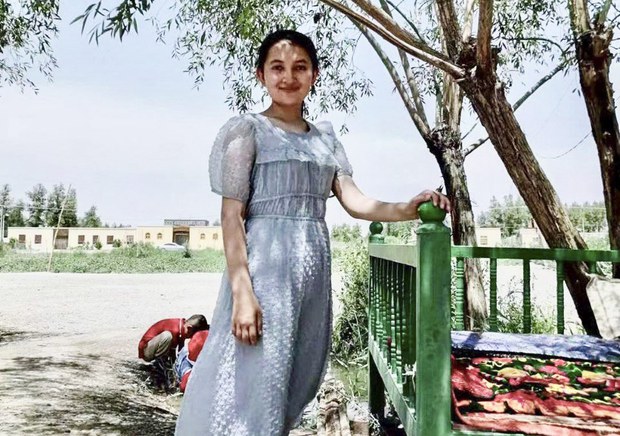A Uyghur man working as an engineer in the United States has called on Chinese authorities in the northwestern region of Xinjiang to release his 19-year-old sister, who was detained in December after posting a video relating to November’s “white paper” protests across China.
“My 19-year-old sister Kamile Wayit has been detained last month, on Dec. 12,” her brother Kewser Wayit said in a short video on his Twitter account on Jan. 22.
“She was a freshman in college studying preschool education at a university in Henan province of China. However, when she went back for winter break, she has been detained by the local Artush city police after her arrival at home,” he said, describing his sister as “caring, courageous and clever.”
“She’s innocent, and committed no crime. I demand the Chinese authorities to release her immediately and let her speak to me,” he said. “I won’t stop until she’s free.”
Kamile Wayit’s detention comes as the authorities detain dozens of young people around the country for taking part in the “white paper” protests in late November.
Sparked by a fatal lockdown fire in an apartment building in Xinjiang’s regional capital Urumqi, the protests also took aim at the rolling lockdowns, mass surveillance and compulsory testing of the zero-COVID policy, with some protesters holding up blank sheets of A4 printer paper and others calling on President Xi Jinping to step down and call elections.
“I don’t know the reason for her detention, but it could be because of one of her posts on WeChat,” he told Radio Free Asia in a later interview. “When the uprising … the protests started in China after the Urumqi fire, she did post something about that.”
“And then the police called my father about it,” he said. “So it could be related to that or it could be related to me being abroad and being a bit, you know, active, here.
Kewser Wayit described Kamile as “very mature and thoughtful” despite her young age, which he ascribed to her traditional Uyghur upbringing in an educated and cultivated family.
“She has read a lot of books about our history, our traditions, about culture, faith and a lot of other things that she can’t unlearn,” he said. “What China is trying to do now, the forced assimilation and trying to reinvent [Uyghur] society by wiping out our culture, our religion, really doesn’t fit with the environment she [was raised in].”
“She didn’t see herself fitting into this place, after seeing so many of her friends change over the past five or six years,” he said. “She still held onto her reason, which I also think presented a challenge to the authorities.”
Kamile had suffered particularly while living alone in an Urumqi high school dorm while her beloved father was in a “re-education” camp between 2017 and 2019, Kewser Wayit said.
“She was going through trauma and depression in those two years, especially because … she was all alone,” he said. “I later learned that those days were really tough for her, that wouldn’t even be able to sleep at night time.”
“She had nightmares and … remained unstable to this day,” he said, describing Kamile as “a fragile kind of soul.”
But she had been a happy, talkative child, he recalled.
“Since she was really, really young, like four or five years old, she would talk a lot and she would tell us a lot of stories,” he said. “Because in the beginning she was brought up by my grandparents.”
Families disappearing
He said many other families in his hometown in Artush are “being taken away or disappearing,” citing the case of his cousin Zulpiqar Qudret, a Shanghai Jiaotong University computer science student who went missing during the summer vacation of 2022 for “using foreign news software,” and who remains in custody today.
Kewser Wayit said he doesn’t want to think about what his sister has been going through in detention.
“I’m imagining what she has been going through for the past 50 days … because if she’s been going through interrogation, you know, whatever they do in custody, it hurts my feelings [just to think about it],” he said.
But he said he won’t remain silent any longer.
“I was silent for almost two years, while the people around me were also losing their relatives, and we just didn’t know what to do,” he said. “[I felt like] if I spoke up, then my mother would be detained, or my siblings, which is just the fear they put inside of us to stop us speaking up.”
“Dictatorships use fear to thrive on,” he said, warning that people overseas won’t be exempt as the Chinese Communist Party redoubles efforts to “export oppression” far beyond its borders.
“It would be a great time to speak up now, because China is afraid for their reputation and they’re afraid of us activists,” he said.

